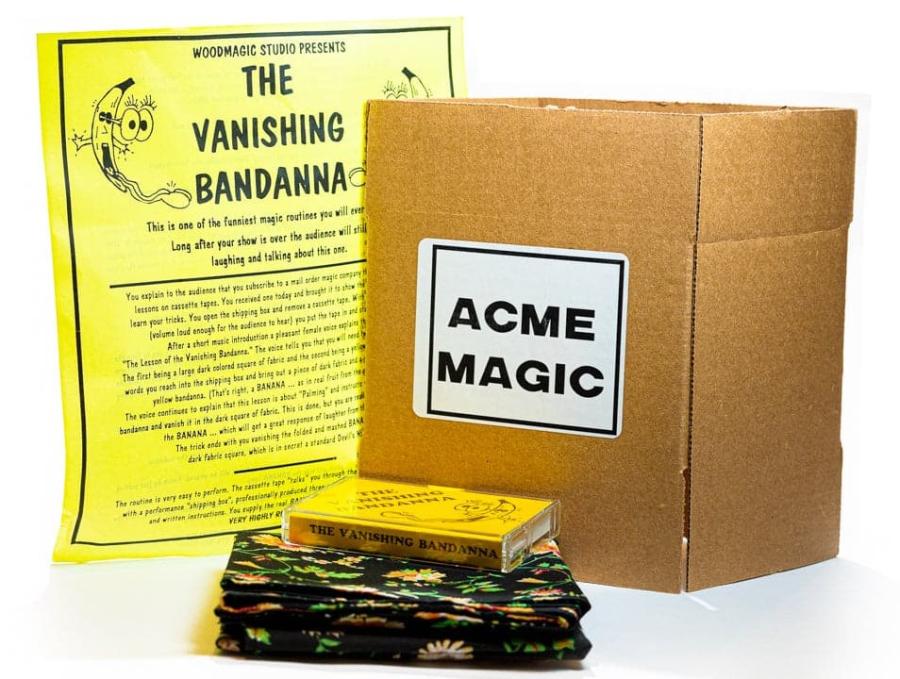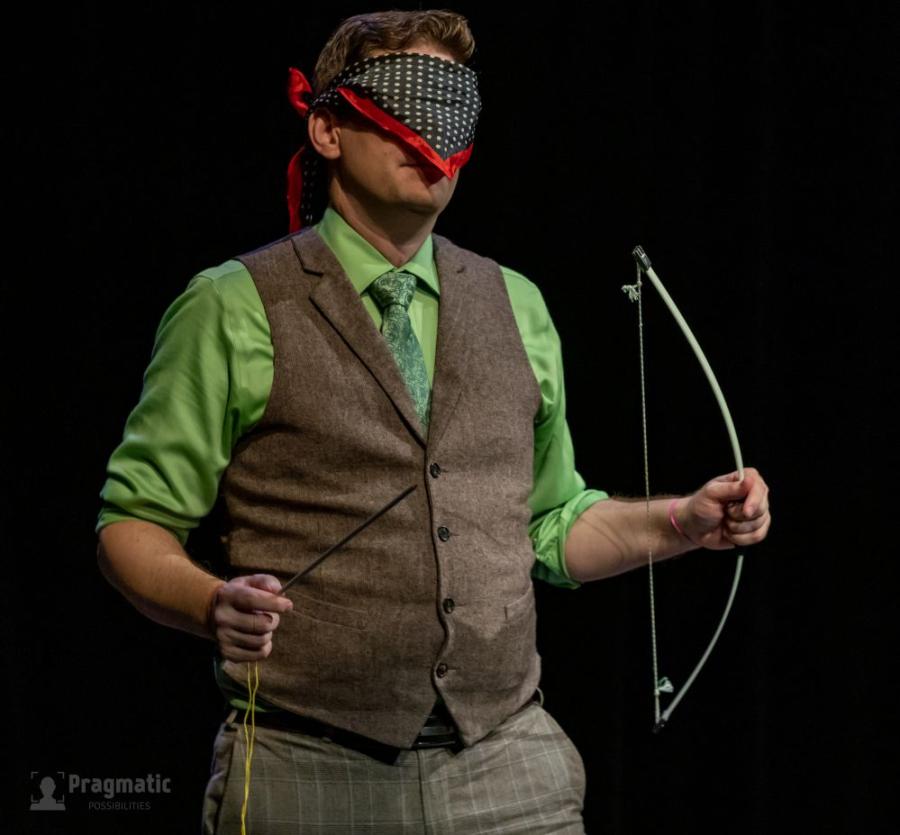Comedy Not Included

“a professional routine that is guaranteed to get you HUGE LAUGHS”
So promises the advertising copy of the Vanishing Bandana routine in the magic shop catalogue. “Huge laughs,” it says, “guaranteed.”
I’ve seen this routine performed at least a dozen times, by a variety of magicians, and I’ve never once witnessed huge laughs. Frankly, I’d advise them to send it back to the shop and cash in the guarantee.
At best, the routine as sold has one reliable laugh in it. The “magical gesture,” for which the magician makes the sign of the cross, praying for things to work out. It’s a genuinely surprising joke, which I’ve always found to get the biggest laugh in an otherwise mild routine.
I’m not hating on the routine because it’s so popular and over-done. Rather, I’m baffled by its popularity. Who out there is showcasing this routine with so much success to inspire the masses? My best guess is that we’ve got ourselves a comedic zombie scenario, wherein the body continues walking having long since lost its soul.
Once upon a time, perhaps, this act was funny. Tom Yarborough seems to be the first to apply the old banana/bandana mix-up gag to a magical act, performing a Square Circle routine as a country bumpkin character. Tom Ogden made it more well-known with his Cut & Restored Bandana act, incorporating a lady’s purse which raised the stakes for bigger laughs. This was adapted for David Copperfield to take it to the (inter)national stage with his Mr. Rogers spoof on his 1986 TV special.
I watched the Copperfield recording and I am convinced the audio track laughs were significantly boosted for the special. When you can see the audience they don’t physically match the riotous laughter you hear. Perhaps this dream being sold by magic shops, of guaranteed huge laughs, is all based on a fabrication of what never was.
I think the Vanishing Bandana, and all subsequent variations, have a fatal flaw which self-destructs any comedic potential. It’s all about the one big secret to all comedy. Go on, ask me, what’s the secret to com…TIMING!
The only real guarantee this routine offers is that the pre-recorded voiceover track is guaranteed to have terrible timing. The vast majority of performances I’ve seen have been awkwardly slow-paced as the tape recording pauses for all the laughs which don’t exist. The performer is forced to stand there mugging in silence for an audience losing their collective patience. This may partially explain the big laugh for the “magical gesture”… it’s the best joke they’ve heard in a while, and sweet relief from the monotony.
I had one friend who worked on this routine for a while. After some trials he edited his audio track to adjust the timing (tighten it up) based on the responses he was getting. It’s never going to be right, though, as timing is entirely dependent on the size of the audience. The bigger the crowd, the slower the pace, and the store-bought recording seemed to be made for your debut at the Hollywood Bowl. For the record, this friend has since dropped magic, retired his bananas, and taken up stand-up comedy.
The Potential of the Premise
I admit I’ve been traumatized by too many pedestrian performances of the Bandana trick, but the truth is I want to like the routine. It’s got a good premise. Most people recognize that it sounds like a funny idea, just that the execution is more delicate than we realize.
A comedy premise, by my understanding, is a pairing of two things; a universal truth plus a humorous interpretation.
In the Vanishing Bandana routine the universal truth is that people sometimes get similar-sounding words mixed up. The humorous interpretation is that the magician is forced to move forward with it and deal with the consequences.
Some people have tried to fix the timing issue by having a live performer reading the instructions, but it puts the premise on shaky ground. If the instruction-reader can see, or hear, the struggling magician they would simply stop, or adjust their instructions. The logic breaks down if it’s not a relentless pre-recorded voice forcing the forward action.
The premise also falls apart when the magician isn’t thrown off by the error. If you’re not playing a convincing role as a reluctant magician-in-trouble, if you’re too eager to follow ridiculous instructions, or too amused with yourself, then the comedic tension dissipates.
I truly believe in the potential for this routine to generate those huge laughs, but I think it is foolishly ignorant to believe they are guaranteed. Dying is easy, comedy is hard. To pull this off you need timing, conviction, and a character to suit.
One Step Ahead, or Playing Catch-Up
Regarding the connection between a comedic premise and character, I’ve learned there is an important distinction in finding what suits you; are you one step ahead of the audience, or trailing behind?
To be one step ahead is to be the cleverest person in the room. You’re in control. Whatever situation might come up, you’ve already thought of it, and prepared your answer. Your audience is often surprised by what happens, but you’re not.
On the flipside, to be lagging behind is to let the audience be smarter than you. They get to notice things before you do, and the humour comes from you being caught out, and playing catch-up to make things work out.
Shawn Farquhar is very good at being the cleverest person in the room. He talks fast and works fast. He released his comedy magic routine Sheer Luck book test, as seen on Penn & Teller: Fool Us. The premise being that you are able to read somebody’s mind, but you cheat in a way that the whole audience can see, except for the one volunteer. The fun is that you get a behind-the-curtain view of Shawn being so damn clever.
I really, really enjoy seeing Shawn perform the routine. It does get those huge laughs, depending on how long he can keep the game afoot. I excitedly bought a set of books for myself, and started doing it in my shows… and it fell flat over and over again. I gave it up and gifted the books to a friend. He seems to be having better luck with it.
I know it’s a great routine, and it does very well for a great many magicians, so it forced me to look at myself as the source of the problem. This test gave me helpful insight into my character and I’ve come to understand one critical thing; I’m an idiot.
It’s okay, because Mike Caveney is also an idiot. He describes his magician character as “a guy who’s ineptness is always saved by some incredible luck or an astonishing occurrence.” He wants the whole audience to be thinking; this idiot is never going to pull off this stunt. When he finally does, he remains blissfully unaware of just how lucky he was.
I’ve found I am a near-neighbour in this regard. The result is the same, though my intention is different. I am a guy who is optimistic about ridiculous plans, which rarely go right, but somehow manage to work out in the end.
Sheer Luck didn’t work for me because the plotline is too straight. Shawn’s routines go exactly as he intends them too. When I’m at my best, my routines become a tangled mess. Thanks to character alignment I have found great success in using Mike Caveney’s routines with very little tailoring required; his bow & arrow card shooting being a big winner for me, with just the right amount of unhinged chaos.

Going back to our beloved Vanishing Bandana, this is a routine best suited for those who trail behind. The audience realizes the mistake, and the consequences of each step in the process, before you do. The whole routine is you trying to catch up until it all, miraculously, works out in the end.
So, if you find your banana is falling flat perhaps you should pick up a copy of Sheer Luck and, I hate to say it, maybe it’s time for me to place an order with the Acme Magic Trick-of-the-Month club.
On a related note, and to prove that a premise is not limited to one application, Scottish comedy legend Ronnie Corbett did something entirely different with fruit-based homonyms, which I find more appealing.